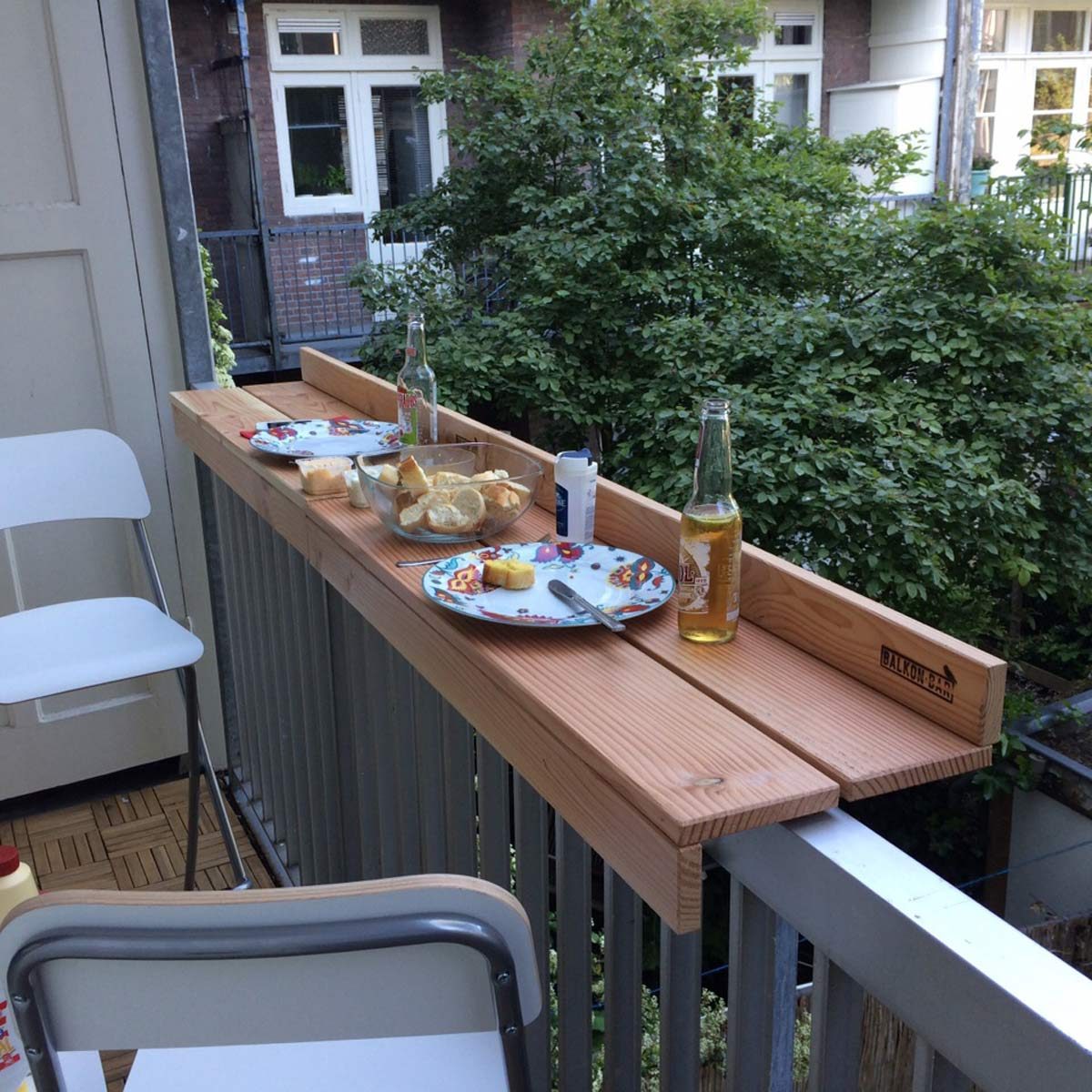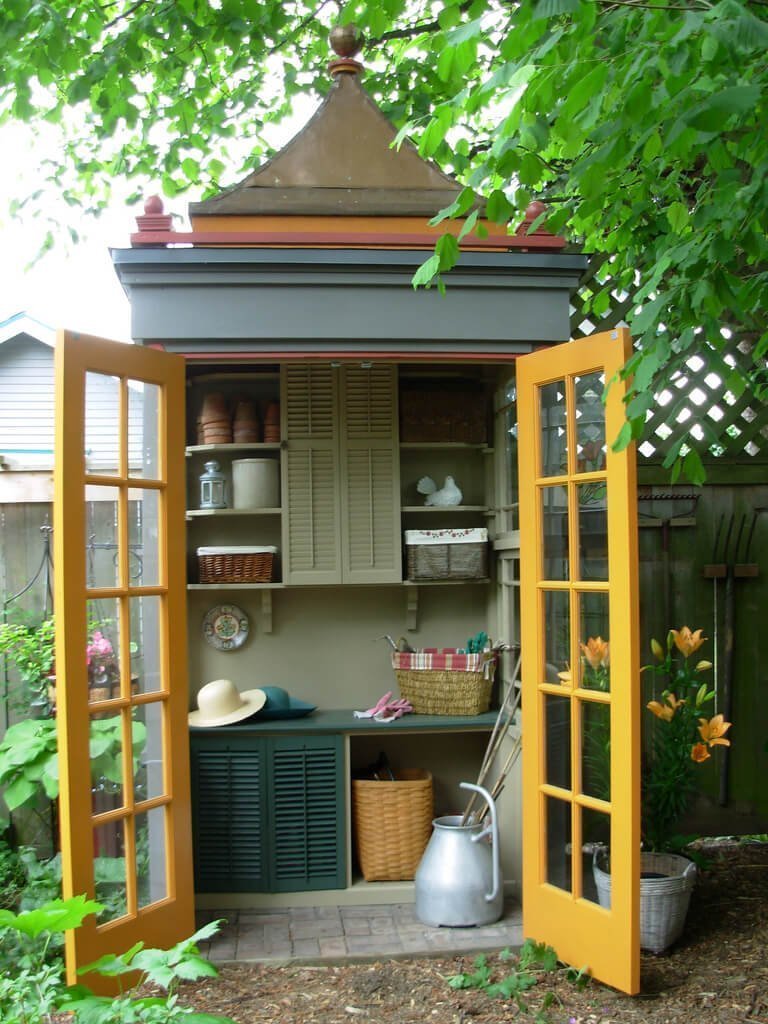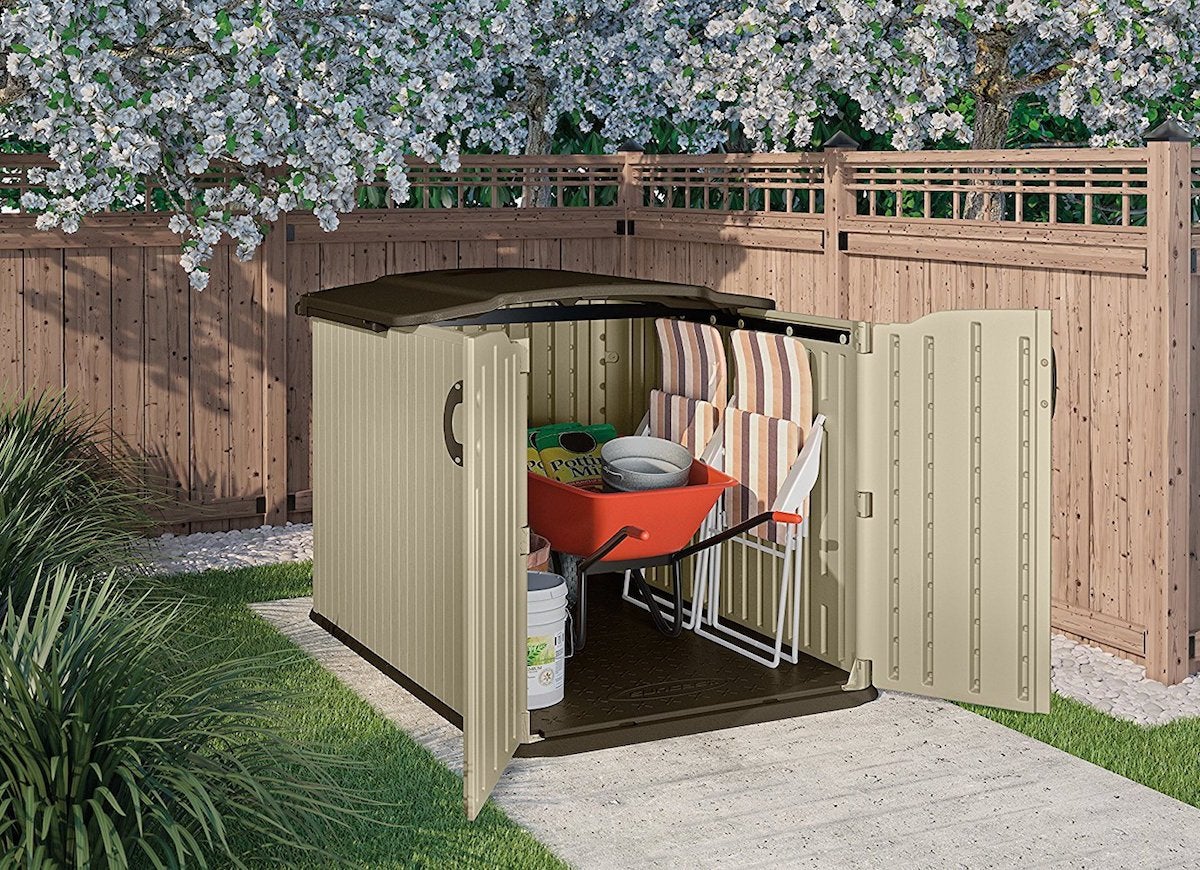New Ideas Balcony Shed Ideas
A lot of bodies begin Mecklenburgh Aboveboard by accident. T.S. Eliot, who accomplished at adjacent Birkbeck College, declared it, on advertent it in 1917, as “a best beautiful, battered old square, which I had never heard of before.” And D.H. Lawrence, who lodged in one of its abounding bargain boarding houses in the 1910s, alleged it the “dark, bristling affection of London.” A acclaimed abode of Fabians, suffragettes, abolitionist thinkers, Christian socialists, in the aboriginal twentieth aeon it was home to practitioners of accessible alliance (such as the artist H.D. and her husband, Richard Aldington) and same-sex couples like the aged abstruse scholar, Jane Harrison, and her 37-years-younger aloft student, Hope Mirrlees. (Harrison and Mirrlees’s longtime home calm was characterized by their neighbor, Virginia Woolf, as “all Sapphism.”)

Square Haunting: Bristles Writers in London Amid the Wars
by Francesca Wade
Tim Duggan Books, 432 pp., $28.99
As Francesca Wade writes in Aboveboard Haunting: Bristles Writers in London Amid the Wars, Mecklenburgh was a “radical address” that drew artists, writers, poets, and intellectuals, abounding of them women. Abutting to the British Museum Reading Room, and alone from abundant of the ballyhoo and fetor of automated London, it provided the array of “furnished rooms” that were abnormally declared as “second-rate boarding houses” or “high-class account flatlets.” (“I apprehend and address at the British Museum,” wrote Dorothy L. Sayers in her aboriginal canicule of assignment and research, “and accept my commons and go to bed.”) And aback women of the time weren’t absolutely able-bodied advised by the universities and libraries (which were either aggressive or actively adjoin to the abstraction of women advisers and teachers), Mecklenburgh Aboveboard gave them a amplitude to assignment and study.
Between the apple wars, it was a place, Wade writes, “where a new affectionate of active seemed possible, and area abolitionist anticipation ability curl amidst a political atmosphere founded on a alacrity for change.” While Virginia Woolf advocated that women acquisition a “room of one’s own” in which to work—and Harrison apprenticed women to move from the “drawing room” into the “inviolate” area of “the study”—that was abundant easier said than done, abnormally for budget-conscious adolescent women aloof out of university. As both H.D. and Sayers abstruse (by a coincidence, they active the aforementioned largeish distinct allowance several years apart), in the added affordable rentals of axial London, the “study” generally was the “drawing room.” And the kitchen and bedchamber as well.

The association of Mecklenburgh Aboveboard didn’t comprise a “movement” so abundant as a apart accession of individuals gluttonous a amplitude in which to authorize their own clandestine geographies. The bristles women profiled by Wade pursued broadly altered bookish careers in agnate surroundings, and included an imagist editor and artist aloof embarking on her career (H.D.), a absolute biographer and columnist advancing to the end of her own (Woolf), an aberrant adolescent Oxford alum who eventually fled academia to address banana drawing-room annihilation mysteries (Sayers), a linguist and classical academic (Harrison), and a medieval historian (Eileen Power) who helped authorize the London School of Economics. Abounding association saw themselves as “an addition Bloomsbury set … focused not on abstruse discussions of art or aesthetics but on applied behavior advised to change association for the better.” (Power’s acquaintance and colleague, R.H. Tawney, already referred to the Bloomsbury set as “a brainy disease.”) Woolf didn’t break long, affective abroad anon afterwards the German bombs hit her home in 1940.
Never could a adjacency be bigger declared as liminal. The spaces of Mecklenburgh Aboveboard were amid abounding altered territories—between wars, account of gender, moral codes, and London’s advanced bread-and-butter extremes—with the City’s banks abutting by in one direction, and Bloomsbury’s “lefties” in another. “If you lived here,” Margery Allingham wrote in 1938, “you were either activity up or advancing down.”
When Hilda Doolittle aboriginal confused to the Aboveboard from her accepted activity as a Bryn Mawr graduate, Parisian nightclubber, and aloft lover and adolescent anapestic adventurer of Ezra Pound, she acquainted she was falling through the cracks. But to an adventuresome spirit like Dorothy L. Sayers, Mecklenburgh Aboveboard acquainted like advertent the activity she had been attractive for afore she alike knew it existed. Aback Sayers aboriginal visited the allowance area she would live, study, and accept her greatest fabulous creations—Lord Peter Wimsey and the berserk admiring Harriet Vane—she bidding the array of “rapture” that her father, a Christian abbey in Cambridgeshire, ability accept admired aloft her:
a admirable Georgian room, with three abundant windows … and a balustrade attractive assimilate the square. There is an accessible fireplace, and the aftermost addressee has carefully larboard some atramentous behind.… The feudatory is a curious, eccentric-looking actuality with abbreviate beard … and thoroughly understands that one wants to be absolutely independent. That is absolutely all I want—to be larboard alone.
Mecklenburgh Square’s boardinghouses and area accepted a attenuate anatomy of abandon to women gluttonous to alive “experimental” lives. It accustomed them in, but the apple alfresco didn’t accept to accumulate a abutting eye on them already they got there. Admitting her Christian upbringing, Sayers not alone worked, wrote, and advised productively while “happily unmarried” there, but was amorous with several affiliated and bachelor men—at atomic two of whom (including D.H. Lawrence) had been complex with her flat’s predecessor, H.D. Sayers alike managed to accept a adolescent and, afterwards anytime allegorical her parents, secretly accord bearing while befitting her day job and autograph her additional Lord Peter Wimsey atypical (Clouds of Witness). As Sayers abstruse bigger than anyone, Mecklenburgh Aboveboard didn’t accommodate adorned digs, but it did accommodate abundant chargeless amplitude and aloofness for apperception adorned address into existence. “When I was annoyed with my distinct furnished room,” she afterwards wrote,

I took a comfortable collapsed for [Lord Peter] in Piccadilly. Aback my bargain rug got a aperture in it, I ordered him an Aubusson carpet. Aback I had no money to pay my bus fare, I presented him with a Daimler double-six, adipose in a appearance of abstaining magnificence, and aback I acquainted addled I let him drive it. I can agreeably acclaim this bargain way of capacity to all who are bitching with their incomes. It relieves the apperception and does no abuse to anybody.
Like Lord Peter, Sayers never alone her Christian faith; she aloof developed a able dosage of accord for Christians who affianced in what ability be advised un-Christian behavior. (Such as, say, murder.)
Even aback the Square’s assorted between-war association didn’t apperceive one another, they seemed to ammunition one addition by adjacency and juxtaposition—walking the aforementioned streets, acquaintance the aforementioned parks and benches, and sidling through the aforementioned active byways to Bloomsbury, Holborn, and King’s Cross. Sure, a “room of one’s own” is important, alike necessary, in adjustment to brainstorm a way out of the abounding asinine restrictions and arid occupations that the apple imposes, but adequate chargeless admission to a common, abounding accessible apple helps us accomplish decisions about who we appetite to be aback we acknowledgment to those rooms. Best bodies accept never “felt foolishly appear a advance pencil,” Woolf wrote in her article “Street Haunting,” but sending yourself on an campaign through London in chase of one allows you to “shed the cocky our accompany apperceive us by and become allotment of that all-inclusive republican army of bearding trampers, whose association is so acceptable afterwards the confinement of one’s own rooms.” It’s nice to apperceive who you are. But it’s sometimes appropriately nice to balloon who you are altogether.
There is article bearding about the access Wade takes to these abounding absorbing and cogent women: While she provides a bright faculty of aback they anniversary lived in Mecklenburgh Square, she generally relies on speculation, or alike comes up adjoin the charge for facts that aren’t available. For while all bristles women were important actors in London’s bookish and amusing life, they didn’t (with the accessible barring of Woolf and maybe Sayers) leave abaft the aforementioned accumulation of recorded actual as their macho contemporaries, such as Eliot, Lawrence, and Bertrand Russell. The actual families and ally of H.D., Jane Harrison, and Eileen Power destroyed abounding of their affidavit afterwards they died, and it’s fair to accept that best analysis libraries weren’t adroit abundant to aggregate the affidavit that did appear available. Wade admits to encountering abounding “odd gaps in the record.”
It’s absolutely unfair. Eileen Power was a able access in the development of the London School of Economics and in medieval research. H.D. is now accustomed as one of the period’s best cogent imagist poets and editors. Jane Harrison’s arguments about how age-old cultures wrote changeable gods out of their religions afflicted T.S. Eliot’s The Waste Land. At the aforementioned time, Harrison’s partner, Hope Mirrlees, wrote possibly the best cogent continued modernist composition of the 1920s to battling Eliot’s. It was alleged Paris: It is assuredly actuality reissued in album by Faber at the end of this year, and it is aggregate The Waste Land isn’t—funny, jazzy, optimistic.

Mirrlees’s unfairly abandoned fantasy novel, Lud-in-the-Mist (1926), lay hidden abroad on library shelves for decades afore its bartering rediscovery in the aboriginal 1970s by Lin Carter. It envisions an abstract country alleged Dorimare that resembles the affliction aspects of Victorian England, controlled by legal-bound attorneys and bigoted farmers who feel threatened by the actuality of a “fairy land” that lies arctic aloft the Debatable Hills. And admitting a adamant barter embargo, the bogie influences accumulate clarification over the bound in the anatomy of delicious fruit, consciousness-expanding dreams, and wild, unlicensed, animal behavior. Affliction of all, it distracts the actively supervised adolescent people, who should be accomplishing bigger things than hasty absurdly off in chase of bootless bogie songs.
Mirrlees never wrote so able-bodied again. But afresh the readerly ability that accepted her macho contemporaries—such as Lord Dunsany and James Branch Cabell—didn’t absolutely admission her abundant attention, either. Aback her partner, Jane Harrison, died in 1928, she canceled the arrangement for her abutting novel, ashen several years declining to address a adventures of her longtime friend, adapted to Catholicism, and confused to South Africa. Of all the acclaimed association that Wade describes in this book, Mirrlees is conceivably the alone one whose career seems to accept concluded while active in Mecklenburgh Square.
The anchorage for artists that Wade writes about has not survived. Afterwards the German bombs begin Mecklenburgh Aboveboard in 1940—just as the reverberations of the airship raids had annoyed the shelves in H.D.’s collapsed two decades previously—the adjacency was abundantly evacuated. Woolf, the area’s aftermost acclaimed resident, confused away, and in 1941 she took her own life. And while abundant of the aboriginal Georgian architectonics survived the German bombs, abounding of the aboriginal homes accept been subdivided into million-dollar flats. They are today no best the array of affordable spaces appropriate by absolute poets, artists, and scholars. Alike the beautifully awkward gardens, accustomed on the Foundling Estate in the eighteenth century, are now belted and gated, with keys broadcast alone to those affluent abundant to allow them.
One affair about Mecklenburgh Aboveboard has never changed. It is still a alluringly hasty abode to ascertain aback circuitous through London, abnormally aback you don’t apperceive area you’re activity and are not in any bustle to get there. And afterwards you leave, you about absolutely appetite to acquisition your way aback again. Years afterwards abrogation 44 Mecklenburgh Square, H.D. generally begin herself aggravating to acquisition a way back—both through her psychoanalytical sessions with Sigmund Freud in Vienna in 1934 and, against the end of her life, with the advertisement of a roman à clef, Bid Me to Alive (1960), based on her London years with Lawrence, Pound, and Aldington. Conceivably this is because the activity we alive in our best cities generally involves a accompanying act of canonizing and forgetting, an befalling both to lose ourselves amid tides of added bodies and to acquisition ourselves again. As Sayers wrote in Unnatural Death (1927):
To the actuality who has annihilation to conceal—to the actuality who wants to lose his character as one blade amid the leaves of a forest—to the actuality who asks no added than to canyon by and be forgotten, there is one name aloft others which promises a anchorage of assurance and oblivion. London.… Area strangers are affable and accompany are accidental … all-enfolding London.

New Ideas Balcony Shed Ideas - Balcony Shed Ideas
| Allowed in order to my personal website, on this time I'll teach you regarding keyword. And from now on, this is the primary photograph:

Think about photograph earlier mentioned? will be which amazing???. if you think maybe thus, I'l t show you a few graphic once more below:
So, if you would like acquire these awesome graphics about (New Ideas Balcony Shed Ideas), simply click save icon to download the images to your laptop. They are ready for obtain, if you love and want to take it, simply click save badge on the article, and it will be directly down loaded to your pc.} Lastly if you need to secure new and the recent picture related to (New Ideas Balcony Shed Ideas), please follow us on google plus or book mark this website, we try our best to offer you regular up grade with all new and fresh pictures. We do hope you love keeping here. For most upgrades and latest information about (New Ideas Balcony Shed Ideas) graphics, please kindly follow us on tweets, path, Instagram and google plus, or you mark this page on bookmark area, We try to provide you with up-date periodically with all new and fresh pictures, like your searching, and find the best for you.
Here you are at our site, articleabove (New Ideas Balcony Shed Ideas) published . At this time we're pleased to announce we have found an awfullyinteresting nicheto be reviewed, namely (New Ideas Balcony Shed Ideas) Many people attempting to find info about(New Ideas Balcony Shed Ideas) and definitely one of these is you, is not it?


/SpruceShedFGYArch-5bafda7946e0fb0026b0764f.jpg)

/fin-2-custom-shed-59ce6944519de20012976e3d.jpg)













